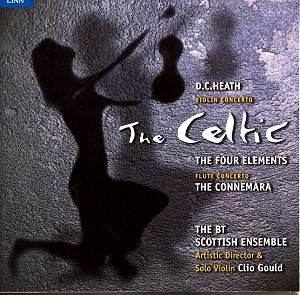I
recently reviewed a related Dave Heath anthology on Black Box.
The Violin Concerto is the only overlap between the two discs.
Otherwise the repertoire coverage is complementary. The Concerto
goes with even more visceral élan in the hands of the English
Chamber Orchestra (Black Box, Ittai Shapira) but by contrast the
sound is less transparent in the hands of Black Box than on this
Linn disc. The Linn also has the advantage of being performed
by its dedicatee, Clio Gould. It is nice in the ‘Cooper’ finale
to hear the ecstatic delirium of music surely reminiscing around
the bell-like finale of Ravel's Ma Mère l'Oye.
Taking
impressions in broad swathes I would say that the Black Box disc
presents the instantly approachable Heath. The Linn takes him
in more uncompromising mode; not that Heath is ever prickly in
any 1970s avant-garde sense.
After
much listening to the two discs you can identify various traits
that together help make a Heath score as personal as one by Vaughan
Williams or Martinů. His music is always clear speaking.
He does not hide in dense thickets of texture. He embraces sentiment
but always steers away from the brink of sentimentality. He is
sympathetic to Celtic culture (witness his enthusiasms for Capercaillie
and Aly Bain). He has a liking for the continuous slip-sliding
oscillation of violins as found in Penderecki's Threnody for
the Victims of Hiroshima and in Alan Hovhaness's overture
Fra Angelico. He holds memory up to the light of emotion
and distils nostalgia from it. There is sorrow in the wings of
his music as well as a rhythmic impetus. Sorrow is in the ascendant.
His
Celtic Air was written in memory of family friend and fellow
flautist Catharine Russell who died of leukaemia in 1993 while
the extraordinary and unsettling Requiem on Black Box relates
to the death of five year old Paul Medrington in a tragic
accident. His string writing taps into the same purity we find
in The Lark Ascending. His melodic invention, and sometimes
his rhythmic patterns, take sustenance from Bartók.
He
takes risks as we hear in the wind-chime noises at the end of
The Celtic Air and the fire engine sirens (UK style) at
the start of the Fire movement of The Four Elements.
Thanks
are due to Glasgow City Council who grant aided this recording.
Let us hope that the City Fathers are far-sighted enough to support
other revivals. Have they heard of Eric Chisholm's turbulent pair
of 1930s symphonies (Chisholm did so much to place Glasgow on
the international cultural map during the 1920s and 1930s). They
could also profitably turn their funding support towards Ronald
Stevenson's music - commissioning the completion of the great
Ben Dorain epic and recording the violin concerto and the
cello concerto.
The
Linn and Black Box discs complement each other perfectly. Once
you have caught the Heath 'bug' (not difficult) you will have
to have both. The Linn is certainly most beautifully recorded
and executed.
Rob
Barnett
MORE INFORMATION
www.dcheath.co.uk
